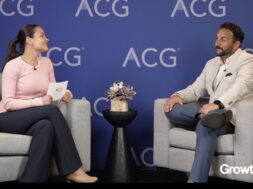Are Talent Executives Ready to Lead in Private Equity?
Over half of private equity firms have at least one human capital leader. Here's a look at their role, impact on value creation, and challenges they face.

The move from “buy-and-sell” to “buy-and-build” continues to take hold across the private equity industry as firms prioritize improving operational performance, generating growth and developing capabilities rather than extracting costs to maximize EBITDA.
With this shift in focus comes a renewed appreciation for the impact of leadership and talent within portfolio companies, which has prompted firms large and small to create human capital positions. Typically filled by former human resource executives or management consultants, these roles are tasked with assessing the capabilities of portfolio management teams and identifying talent and leadership gaps.
The Harvard Business Review reported in 2017 that over half of PE firms now have one or more individuals tasked with a “leadership capital partner” role. Among Summit’s private equity clients, all currently have a human capital leader in place. Based on conversations within the industry, we estimate that 80% of PE firms with more than $5 billion of assets under management employ an executive charged with overseeing the talent and organization performance of their portfolio companies.
As a relatively new position within the PE industry, the role looks different across firms and continues to evolve. In an effort to better understand the human capital executive position, we interviewed 12 talent leaders—employed by firms ranging from large global buyout funds to smaller U.S. middle-market players—to glean insights into the nature of their job and their ability to impact value creation, along with challenges they face.
Entering the Role
Many private equity firms recognize the value of having a human capital executive, but most have failed to fully or consistently define the role, leaving that to the executives themselves.
All but one of those interviewed were the first to hold such a position at their firm, and many had to define the role for themselves. For most of our subjects, defining and refining the role and identifying where they can add the most value was a top priority early in their tenure.
The human capital executives we interviewed came into their roles in different ways. Some arrived from traditional human resource backgrounds, some from executive search, others management consulting, while some migrated from other areas within private equity. All of them said earning credibility with the investment teams and portfolio company management was an immediate requirement, particularly at firms where partners viewed the position with ambiguity or skepticism. To earn credibility, successful talent executives immediately set out to demonstrate value and produce results, notching even small wins as quickly as possible. Most of these talent heads grew in the role and stature at their firms through three distinct phases:
Showing Value as HR Practitioner
Most executives said their role began as ambiguous and transactional, involving responsibilities and activities that run the gamut across human resources. A quick win at the outset, according to those interviewed, involved working with portfolio companies and management teams to introduce valuable knowledge, tools and resources for HR and talent management.
One activity that was often cited was assessing a company’s CEO and management team early on in their tenure.
While not as strategic, these transactional practices provide the private equity talent head opportunities to work with leaders of their portfolio companies, building important relationships that set the foundation for greater work.
Becoming a Broker of Talent and Expertise
While the practitioner role may help talent leads get noticed and quickly add value, it is usually not a sustainable practice across an increasingly growing portfolio. Successful human capital executives typically shift into a broker type of role, which usually takes on two forms: broker of talent and broker of expertise.
On the talent side, successful human capital executives have built a network so they can match the needs of the role with their list of C-suite talent. One key element is actively managing the network of company alumni, retired partners and others by continuously adding to it, attending conferences and leveraging technology to stay in touch.
On the expertise side, as one executive stated, “I’m a practitioner at heart—I like doing the work, but there is a volume challenge, and due to that, I need to hire outside expertise.”
While the talent heads will outsource work, typically they are highly involved with choosing experts and creating partnerships with firms to provide services to their portfolio companies. One executive said that 80% of their time is now spent helping the company pick the right expert for the need—such as search, coaching or consulting—and to help portfolio executives think about “how to set it up, how to pick [an expert], how to communicate it, and how to get and measure the results of the work.”
Some talent executives are selective about which services they outsource. One person interviewed said she often does the diligence and recruitment/search practices personally, but leverages third parties for “more comprehensive work.”
Landing the Role of Trusted Adviser
The roles discussed previously lead the way to becoming a trusted adviser to the partners and portfolio company executives. Becoming a successful human capital leader for a PE firm requires a broad level of thinking and understanding of the business and investment strategy of the firm and its portfolio companies. As one client suggested, new human capital executives need to quickly “get smart on the business first and learn how PE works and how they think about success.” By understanding the needs of the business, they are seen as not just an HR provider but a way to link talent to the ultimate goal of peak performance and value creation.
In addition to advising on the intersection of talent and business, human capital leaders must earn trust by building solid relationships across the portfolio. That trust is built by being up front with all parties on the talent executive role and end goal.
A good reputation with one CEO can have a strong ripple effect and extend to trust with others. One executive recalled talking to over 15 CEOs about what they needed; he then came back with a list of 45 things he could do based on their feedback. This helped to build trust and respect. Those “strong relationships from the CEOs trickled back to the investment team,” he said.
For one executive, it took two years to build that type of trust and get a seat at the proverbial table. Now, no board or management decisions are made without his input. Another spent the first year in the role doing “crappy work” until she was able to execute a flawless CEO succession, catching the attention of the partners.
Even after securing a seat at the table, keeping it is no guarantee. Said one executive: “I had a seat from Day 1 but had to continue to contribute and make a difference to keep it.”
Ensuring Continued Success
The human capital position is still relatively new, as are performance evaluations for this role, and they can vary from one firm to the next. At some firms, end-of-year performance evaluations are qualitative and based on how valuable portfolio CEOs perceive the individual to be.
Other performance assessments use quantitative metrics, such as the number of portfolio companies supported, positions successfully filled, and business outcomes achieved. One executive noted that her performance is evaluated based on a combination of self-assessment and feedback from CEOs, as opposed to “stupid HR metrics.” One firm conducts a 360-degree survey to collect feedback from all human capital touch points among investment partners and portfolio teams. At the end of the day, says one executive, “It’s all about contribution.”
The role of human capital executive can be a lonely and daunting one. They often exist in single-person departments or, at most, have one direct report. While there is no formal organization or association supporting the PE human capital executive, emerging roundtables and peer groups can provide opportunities for professional development and camaraderie.
As the role continues to evolve, one executive noted that it’s important to remember that success comes from being “patient on what you can achieve” and “recognizing that every opportunity is a learning experience.” Key attributes of the most impactful private equity talent executives include strong business acumen, a hands-on approach, functional expertise in talent, the ability to partner with company CEOs, and enough confidence and ego to work with investment partners as a peer.

Dan Hawkins is founder and president of Summit Leadership Partners, a consulting firm advising boards, investors, CEOs and senior leaders on delivering peak organization performance.


